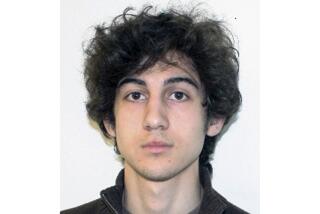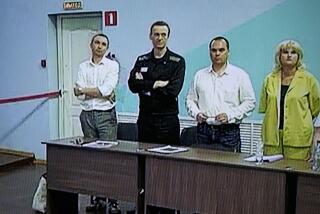‘I am sorry,’ Dzhokhar Tsarnaev tells Boston Marathon victims at his sentencing
- Share via
Reporting from Boston — In a thick Russian accent — with his head bowed and body shaking — the man who appeared cold and emotionless throughout his trial for bombing the Boston Marathon two years ago stood in federal court Wednesday and apologized for detonating one of two explosives at the historic race.
Dzhokhar Tsarnaev, 21, stood nervously in a courtroom packed with survivors, jurors, lawyers and the federal judge who would shortly thereafter formally sentence him to death. He repeatedly invoked his Muslim faith while telling victims, “I am sorry for the lives I have taken, for the suffering I have caused you, and for the terrible damage I have done. Irreparable damage.”
He added, “If there is any lingering doubt, let there be no more. I did do it along with my brother.” Of the bombings, he said, “I am guilty.”
The words of admission and regret, the first he has uttered publicly, followed the powerful testimony of several dozen victims and relatives of the dead gathered in the courtroom. Earlier in the day, 23 of them — some still angry and suffering, others ready to move on and forgive — told the judge how the April 15, 2013, bombings had forever ripped apart their lives.
Many dismissed Tsarnaev’s statement as inadequate. “A simple, believable apology would have been nice,” said Lynn Julian, an actress who suffered a concussion in the attack. “But there was nothing sincere or believable in what he said.”
Scott Weisberg, a physician who lost much of his hearing, agreed: “I don’t think it was genuine.”
But Henry Borgard, a young college English major who now walks with the aid of a service dog, said he had forgiven Tsarnaev. “I have come to a place of peace, and I genuinely hope he does as well,” Borgard said. “For me to hear him say he is sorry — that is enough for me.”
It was a day of raw emotion in the federal courthouse, beginning with the victims’ statements, followed by the startling announcement that Tsarnaev would speak publicly for the first time since the trial began, and ending with U.S. District Judge George A. O’Toole Jr. telling him, “I sentence you to the penalty of death by execution.” Though the federal jury had previously voted to impose the death penalty, O’Toole’s sentence made it official.
Tsarnaev was escorted out of the courtroom by two U.S. marshals. Prosecutors said he would be taken to federal prison, possibly the supermax fortress in the Colorado Rockies, and eventually to federal death row in Terre Haute, Ind. There, he will become the youngest federal inmate, waiting to surrender his life for murdering three people and injuring more than 260 others in the twin pressure-cooker bombings, and for killing a police officer during the subsequent manhunt.
For most of the two-month trial, Tsarnaev’s silence and apparent lack of engagement made him something of an enigma to jurors and the public. He declined to testify in his own defense. And despite briefly choking up when his Russian aunt testified about his upbringing, Tsarnaev displayed no emotion through often gruesome medical testimony about injuries and heart-wrenching accounts from eyewitnesses. At times he appeared distracted or even bored.
On Wednesday, Tsarnaev’s four-minute statement offered the only firsthand insights to date about the young man’s state of mind, motives and thoughts about the attack. Dressed in a dark sport coat and gray shirt, his black hair and beard disheveled, Tsarnaev appeared to have memorized his comments.
“I am a Muslim. My religion is Islam,” he said. “I ask Allah to bestow his mercy on those present here today. I pray for your relief, for your healing, for your well-being, for your strength.
“I ask Allah to have mercy on me, my brother and my family,” he said.
Tsarnaev acknowledged how difficult it must have been for the victims and survivors to address the court earlier in the day, and he praised them for speaking “with strength and with patience and with dignity.”
At one point, he seemed to acknowledge criticisms that he had detached himself from the trial and ignored victims’ painful testimony. “I was listening,” he told the court.
He said the Koran teaches that “no soul is burdened with more than it can bear.” He also noted repeatedly that in the Islamic faith, this is the “blessed month of Ramadan to ask forgiveness of Allah.” He ended with, “Praise be to Allah, the lord of the worlds.”
It was startling to most that he spoke at all. With legal appeals in his case automatic, many predicted he would not speak out of concern for jeopardizing his future, or because he had nothing he wanted to say.
But Judy Clarke, his lead defense lawyer, told the court that Tsarnaev had been prepared to offer a formal statement of remorse earlier in the case in return for a plea bargain with the government. But she said prosecutors rejected the offer.
Tsarnaev’s attorneys had advised him to avoid testifying during the trial, but he had expressed a desire to speak once it was over, according to a source close to the defense team. During his two years in custody, Tsarnaev has grown closer to his faith, which may have played a role in his desire to express remorse to the victims, the source said.
In handing down the death sentence, O’Toole cited Julius Caesar and quoted an aria from Verdi’s Italian opera, “Otello”: “Credo in un Dio crudel,” or “I believe in a cruel God.”
But O’Toole said someone who believes in a cruel God cannot also expect that God to “smile upon him.”
He told Tsarnaev, who immigrated to the Boston area as a young boy with his family, that despite the nice things his teachers and friends said about him from the witness stand, in the future “whenever your name is mentioned it will be about the evil you have done.”
The judge admonished Tsarnaev for being taken in by violent extremists. “They are not leaders,” he said. “They are misleaders.”
Many of the victims had their final say too. Most did not look at Tsarnaev, and he did not look at them. None mentioned him by name, calling him “the defendant.” Some said they wished he had gotten help for his older brother, Tamerlan Tsarnaev, who the defense said was the ringleader of the attack and who was killed during the police manhunt.
Some dismissed the younger brother as incompetent, a follower. “You failed as a soldier in jihad,” said William Campbell, whose daughter, Krystle Campbell, was among the dead. Said Karen McWatters, who lost her left leg: “You ruined so many lives. You also ruined your own. You will die alone in prison.”
Last to speak was Rebekah Gregory, another amputee. “You and your brother have lost,” she said.
“Your intent was to destroy America. You have actually unified us. Choosing us to mess with was a terrible idea.”
More to Read
Sign up for Essential California
The most important California stories and recommendations in your inbox every morning.
You may occasionally receive promotional content from the Los Angeles Times.











